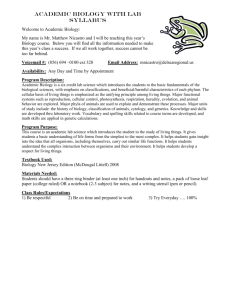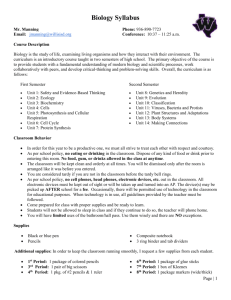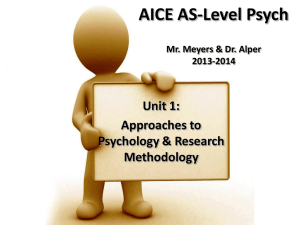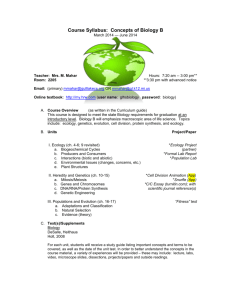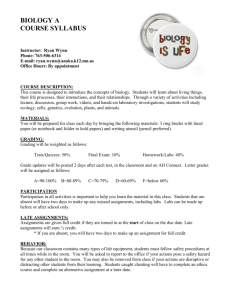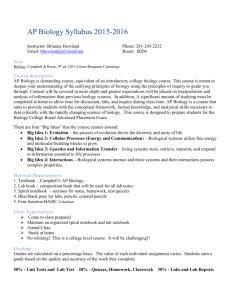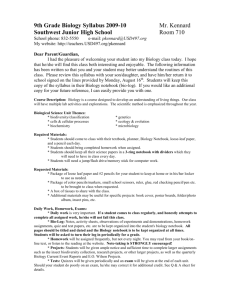2015-2016 AICE Biology: Course Outline and Policies
advertisement
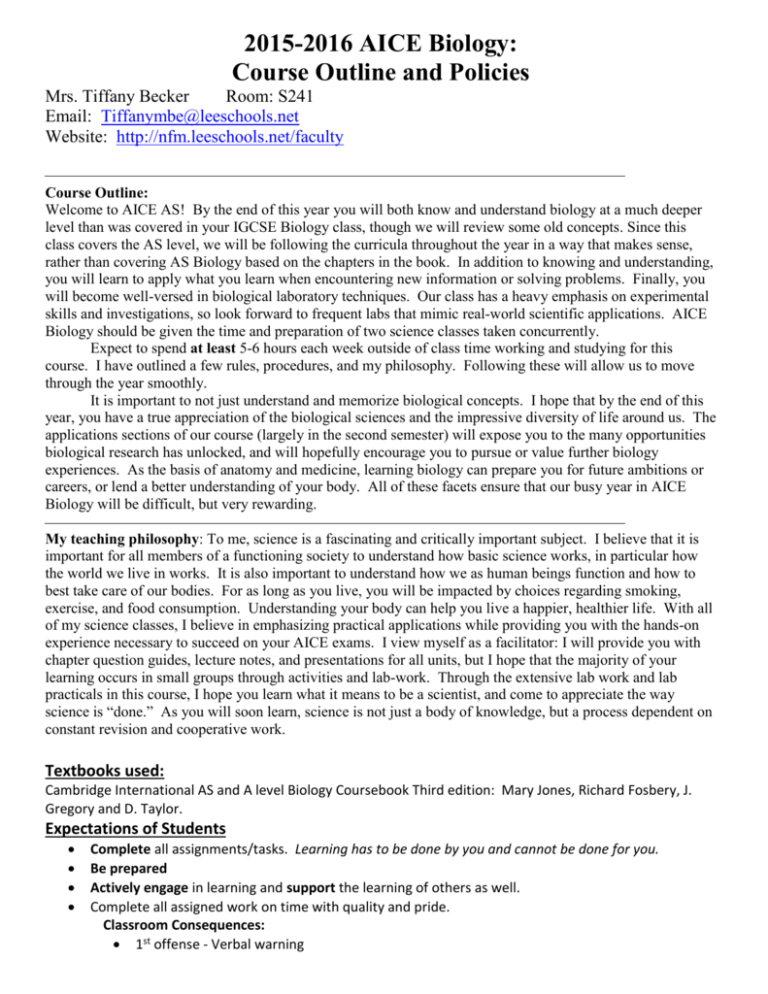
2015-2016 AICE Biology: Course Outline and Policies Mrs. Tiffany Becker Room: S241 Email: Tiffanymbe@leeschools.net Website: http://nfm.leeschools.net/faculty Course Outline: Welcome to AICE AS! By the end of this year you will both know and understand biology at a much deeper level than was covered in your IGCSE Biology class, though we will review some old concepts. Since this class covers the AS level, we will be following the curricula throughout the year in a way that makes sense, rather than covering AS Biology based on the chapters in the book. In addition to knowing and understanding, you will learn to apply what you learn when encountering new information or solving problems. Finally, you will become well-versed in biological laboratory techniques. Our class has a heavy emphasis on experimental skills and investigations, so look forward to frequent labs that mimic real-world scientific applications. AICE Biology should be given the time and preparation of two science classes taken concurrently. Expect to spend at least 5-6 hours each week outside of class time working and studying for this course. I have outlined a few rules, procedures, and my philosophy. Following these will allow us to move through the year smoothly. It is important to not just understand and memorize biological concepts. I hope that by the end of this year, you have a true appreciation of the biological sciences and the impressive diversity of life around us. The applications sections of our course (largely in the second semester) will expose you to the many opportunities biological research has unlocked, and will hopefully encourage you to pursue or value further biology experiences. As the basis of anatomy and medicine, learning biology can prepare you for future ambitions or careers, or lend a better understanding of your body. All of these facets ensure that our busy year in AICE Biology will be difficult, but very rewarding. My teaching philosophy: To me, science is a fascinating and critically important subject. I believe that it is important for all members of a functioning society to understand how basic science works, in particular how the world we live in works. It is also important to understand how we as human beings function and how to best take care of our bodies. For as long as you live, you will be impacted by choices regarding smoking, exercise, and food consumption. Understanding your body can help you live a happier, healthier life. With all of my science classes, I believe in emphasizing practical applications while providing you with the hands-on experience necessary to succeed on your AICE exams. I view myself as a facilitator: I will provide you with chapter question guides, lecture notes, and presentations for all units, but I hope that the majority of your learning occurs in small groups through activities and lab-work. Through the extensive lab work and lab practicals in this course, I hope you learn what it means to be a scientist, and come to appreciate the way science is “done.” As you will soon learn, science is not just a body of knowledge, but a process dependent on constant revision and cooperative work. Textbooks used: Cambridge International AS and A level Biology Coursebook Third edition: Mary Jones, Richard Fosbery, J. Gregory and D. Taylor. Expectations of Students Complete all assignments/tasks. Learning has to be done by you and cannot be done for you. Be prepared Actively engage in learning and support the learning of others as well. Complete all assigned work on time with quality and pride. Classroom Consequences: 1st offense - Verbal warning 2nd offense - Parent Phone Call 3rd offense - Student/teacher/parent conference 4th offense – Referral Academic Integrity The AICE program Honor Code simply stated is: Students shall be honor bound to refrain from cheating of every kind, including plagiarism. Students shall be honor bound to take actions to stop any and all violations of this Honor Code, which they see. Inaction implies that one condones inappropriate behavior. Living in a manner consistent with this code will produce an atmosphere of trust, freedom and integrity necessary to the success of each student in this program. 1st violation- student will earn a zero on the assignment or assessment, a referral for cheating and student/parent/teacher conference. Cambridge students caught cheating on assignments or examinations could be put on Cambridge probation, or in extreme cases, removed from the program. To succeed in this class and truly learn, you must work to complete your own work. While I encourage students to study and work together, keep in mind that all submitted work should be a representation of what YOU as an individual put forth. For partnered or group lab activities, each member of the group must submit original work. There is a clear difference between copying data, and copying an assignment. (Excused Absent) Make-Up Work Policy: Missed assignments, labs, or tests can be made up on your return to school according to district policy. It is YOUR responsibility to pick up all make-up work, get missed notes from a classmate, and schedule a time to make up any missed examinations and labs. According to district policy, you will have the same number of calendar days to turn in missed class work as the number of days you were absent plus one. Content Course of Study: Semester 1 Cell structure Biological molecules Enzymes Cell membranes and transport Cell and nuclear division Infectious disease Semester 2 Genetic control Transport in multicellular plants and mammals Mammalian Heart and Gas exchange Immunity Assessment Objectives of AICE Exam Knowledge and Understanding: assessed in Paper 1, which consists of 40 multiple choice questions. This paper will be weighted 40% of the final total available marks Handling information and problem solving: assessed in Paper 2, require short or essay type answers related to data and/or drawings, applying mastered knowledge of biological concepts. This paper will be weighted at 37% of the final total available marks. Experimental skills and investigations: assessed in Paper 3, this practical paper is assessed in approximately two parts. One will require the use of a microscope. In the other, students will be expected to show evidence of skill in handling of familiar biological material. Where unfamiliar material/techniques are required, full instructions will be given. This paper will be weighted at 23% of the final total available marks. Rules My classroom has three general, simple rules that are explained on our first day of class. I only set forth rules that I am willing to follow, and promise to always adhere to these as well. •Be respectful of yourself, others, and the environment. Please take care to treat those around you with respect. As juniors and seniors, many of you are completing difficult coursework and preparing for college. Behave appropriately, don’t speak when others have the class’s attention, and refrain from using cell phones unless you have DIRECT PERMISSION from me. •Be honest. If you are struggling, let me know. I am here to help you and make sure you learn. I am here most mornings by 6:30am and stay after school daily. If you ever need extra assistance, don’t wait until the night before a test to get it. In addition to this, always abide by the honor code and complete your own work. •Try your best. I have no doubt that everyone in this class wants to succeed. I will always do my best to help you learn, so I expect your best work and effort in return. Policies 1. Personal responsibility: AICE courses are written at the college level and move at a college pace. This makes them an excellent opportunity for you to prepare for higher education, but at the same time, you will have to work hard to learn and keep up with information. All students are expected to come to class prepared, and are expected to participate in lectures and class discussions. Come to class with questions and all reading guides completed by the date of the lecture. This will make the material MUCH more manageable for you! 2. Labs: As a college-level course, we will be doing multiple labs each nine weeks. The Labs will take place in S244 on Wednesdays and/or Thursdays. Some labs will require that you create formal lab write-ups (these will be announced and explained as we progress through the class), while other labs will be more short-form. Lab notes and procedures will be taken in lab notebooks unless otherwise specified. Please bring your notebook and proper shoes to class on these days, as labs will not always be announced in advance! 3. Materials: All students need to bring pencils, a calculator, a notebook for labs, and blue or black pens ONLY every day in class. You must also keep a notebook with all of your AICE Biology coursework throughout the year. I recommend using a 3 or 5-subject notebook, and will collect notebooks periodically. Your notebook will contain your reading guides, lecture notes, practice questions and test reviews, and additional work. The first pages in your binder should be this syllabus. 4. Late and Make-up Work: All class work and homework is mandatory, even if you were absent! Work is due at the start of class unless otherwise specified. The work is important for you to work with your groups. You are allowed 1 unexcused late assignment per QUARTER that will be accepted up to one class day past the due date. Any late work will have major points deducted and could hinder class activities to be conducted. All assignments (classwork or homework) and tests not complete will be recorded as a zero in the grade book. If you miss a lab or major activity due to emergency or illness and have an excused absence, speak with me privately to arrange making up the work. You will likely have to stay after school for one-several hours. It is your responsibility to retrieve your makeup work the day you come back. 5. Bathroom policy: Please limit bathroom use, especially during lab activities. 6. Submitting Work: Work is accepted in one of two media. You may submit due work at the start of the class period during which it’s due (unless otherwise specified), OR you may e-mail me your work by the due time. Notebooks and lab journals must be submitted in person. If you are absent on a day work is due and your absence is unexcused, you need to submit it to me via e-mail or receive a zero. Submitted work must be neatly written. Writing needs to be legible and in a dark enough color that I can see it. If I can’t read it, I won’t grade it. 7. Tests and Quizzes: You are responsible for taking tests and quizzes the day they are given. If you are absent the day of a test or quiz, I reserve the right to give you an alternate, likely all essay version of the exam. If your absence is unexcused, you will earn a zero. 8. Classroom reminders: Would you like to receive reminders about assignments that are due, go on blackboard or google classroom. 9. Animals: Please treat my classroom pet with the same respect you would treat your own. Anyone who harasses an animal, opens the cage without permission, or intentionally harms the animal will be written up with serious consequences, and parents will be called. Classroom animals are a privilege, and only by following careful instructions regarding them can I guarantee their safety. 10. Dissections: Throughout the year, you will be required to carry out dissections on various plant and animal tissues. These dissections are important for deeper understanding of how organisms fit together and function, and are an essential part of any high-level biology course. If you are uncomfortable with dissections, you must provide a letter from your parents explaining why by Friday, August 28, 2015. Students uncomfortable with wet dissections will be required to complete alternative assignments at my discretion, or will earn a zero. Grading Policies Your grade in this class will be based on a total point system. You’re able to calculate your grade at any point by adding up how many points you have earned and by dividing by how many points are possible. You may also check Parentlink for accurate grades soon after many assignments. While I promise to grade assignments as quickly as possible, I have more than a hundred and ninety students I will be assessing regularly. Your learning will be assessed using the following methods: 1. Tests/Exams (100-150 points each, one per unit with some smaller units potentially combined): Tests will all be based on past AICE exams. They will comprise of a mixture of multiple choice, free response, essay, and diagram questions. 2. Labs (20-30 points for formal write-ups, 2-3 each nine weeks, plus 75-150 point lab notebook grade each nine weeks): You will be required to keep a lab notebook to be graded each nine weeks, and will also have 2-3 formal lab write-ups each nine weeks. This class has a heavy emphasis on lab importance because of its high level and AICE Biology Paper 3. Always follow instructions in the lab for safety reasons. You will be receiving a safety contract outlining all laboratory procedures. Expulsion from a lab for poor safety behavior will result in a zero on that day’s lab activities. Please bring lab notebooks and close-toed shoes to class every day. 3. Notebooks (50 points, by the end of each nine weeks): I will collect class notebooks periodically without warning. Your notebook should have the guided readings, lecture notes, practice questions and test reviews, lab thoughts, activities, and additional work. The first pages in your binder should be this syllabus. 4. Guided Reading Assignments (20-40 points each, one-three per unit): I will provide question and problem sets prior to each unit to complete while reading the textbook. These will be due the first day of lecture on a new topic. 5. Problem Sets (20-50 points each, one per unit): I will provide question sets and review questions to help prepare you for each exam. These are due the day of the test, prior to beginning the exam. 6. Small, additional assignments: These will be occasional and varied, and will typically be worth 5-30 class points. The Lee County Grading Scale is used for this course Grading scale: A = 90 - 100 C = 70 - 76 B+ = 87 - 89 D+ = 67 - 69 B = 80 - 86 D = 60 - 66 C+ = 77 - 79 F = 0 – 59 AICE Science Percentage Value: Formative: Quizzes (Paper 1&2) 25% Cornell Notes/Video Lectures/Classwork/Homework 10% Summative: Unit Exams (Paper 1&2) 35% Labs (Paper 3) 30% AICE Biology Tentative Topic Outline, In Order (subject to change) Approx. Text page(s) Approx. Amount of time Spent Date of Completion -- 2 days 8/27/15 pp. 197-216 3 days Cell Structure (cell biology, microscopy, cell organelles plant vs. animal cells, prokaryotes and eukaryotes, tissues and organs) pp. 1-28 5 days Biological Molecules (polymers, carbohydrates, lipids, proteins, water, inorganic ions) pp. 29-53 9 days Enzymes (activation energy, reactions and reaction rates, inhibitors) pp. 54-68 3 days Cell Membranes and Transport (Phospholipids, membrane structure, transport across membrane, exchange surfaces) pp. 69-85 5 days Cell and Nuclear Division (chromosomes, two types of nuclear division, mitosis, cancer) pp. 86- 102 5 days Gene Control (DNA,RNA, base pairing, transcription and translation) pp. 103-117 6 days Transport in multicellular plants (water transport, translocation, sieve elements and xylem vessels) pp. 118-143 7 days Topic Introduction to Biology, command words, online set up Infectious Disease (worldwide importance, cholera, malaria, AIDS, tuberculosis, antibiotics) Mammalian Transport System and the Mammalian Heart (cardiovascular system, plasma tissue fluid, lymph, blood, hemoglobin, myoglobin, oxygen transport issues, cardiac cycle, heart beats) 9/22/15 10/17/15 10/30/15 11/12/15 12/1/15 12/17/15 1/28/16 2/22/16 pp. 144-163 pp. 164-173 8 days Gas Exchange (gaseous exchange system, respiratory system, breathing rate and heart rate) pp. 174-181 2 days Smoking and Disease (tobacco smoke, lung disease, proving the link between smoking and disease, cardiovascular disease) pp. 182-196 2 days Immunity (defense against disease, immune system, active and passive immunity, measles) pp. 217-233 5 days 10-12 days REVIEW-Past exams- self-study; questions; lab mock trials 9/4/15 --- Depending on exam dates 2/26/16 3/3/16 3/17/16 4/21/16 – 4/29/16 **Thanksgiving break**nothing scheduled at this time. Depends on class pace. **Winter break: guided reading & videos on plant transport. Will have quiz day we come back. **Spring Break: Revision guide notes. Online Tutorial times with http://blackboard.leeschools.net Monday & Friday: 3-4:30pm Tuesday & Thursday: 8-9:30pm ---- 6 hours 8/24/155/27/16 Extra Credit: I do not hand out extra credit work. I will however have homework passes that will be good for 5 points on a test or quiz or lab write up. These homework passes can be used at any time and can be stacked/ accumulated. These are given periodically for acts of kindness or going above and beyond what an AICE student would do. Students can help with the class pet, help set up or break down the labs after school, answering tutorial questions on blackboard.leeschools.net, or help with cleaning up and organizing the class and lab. Classroom Format: Class: Each day students are in the classroom (not the lab) they will have a Question of the Day (QOTD)on the board that they must answer on the left side of the notebook which will be taken from old paper 2 tests. Students will then take a quiz on one of several things including homework, videos, vocab, guided reading etc…, and then there will be a mini lecture on the most challenging topic(s); after this students will work on an activity to help reinforce the topic(s). At the end of class students will be assigned homework, reminders, reflections, and be allowed to clean up. Lab: Students will take out only their lab notebook and make sure they are wearing close-toed shoes. All belongings that are brought into lab will need to be out of the lab area. Students will work in pairs until comfortable with the lab then will gradually move to individual lab practices. Students will have pre-lab information written into the right side of their lab notebook at the start of class. Students will get personal protection equipment (PPE), read over pre-lab, obtain materials, and then conduct experiment. Students will be given a 5 minute warning to conclude experiment and will be given 10 minutes to clean up and reset the lab. All belongings cannot be obtained until class has been dismissed. Summer work: This assignment on infectious diseases needs to be turned in by Friday the 28th of August at 11:59:59pm. It can be scanned in or photographed and uploaded then emailed AND turned into blackboard (I will demonstrate this on Friday). It can be turned in to classroom block bin. I am looking forward to an excellent year in AICE Biology! I have a lot of fun labs and activities planned, and cannot wait to get started. Please let me know at any point if you have questions, and parents are always able to contact me by e-mail or by leaving a message with the school. Thank you all in advance for your hard work and positive outlooks for the year ahead! Acknowledgement of reading course outline and policies: Go onto google classroom (with a parent) and submit the form of acknowledgement. This is your first assignment in the classroom and is due the 26th at 11:59:59pm.
